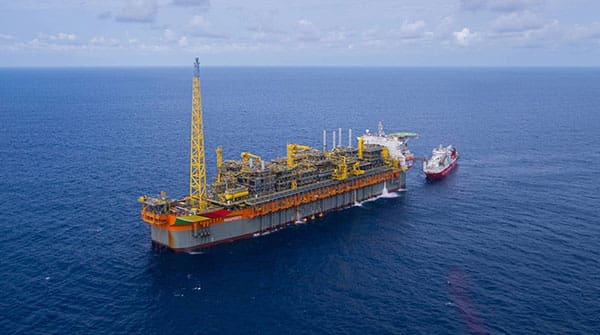ExxonMobil and Chevron are fighting over Guyana’s lucrative Stabroek oil block
 Not since the 1996 “cola wars” when Coca-Cola secretly purchased Pepsi’s operations in Venezuela from the Cisneros Group have we had U.S. global corporate majors competing head to head in any market in the Americas. That deal of $500 million in 1996 ($983 million in 2023 dollars) is a standard on B-school case studies of M&A business.
Not since the 1996 “cola wars” when Coca-Cola secretly purchased Pepsi’s operations in Venezuela from the Cisneros Group have we had U.S. global corporate majors competing head to head in any market in the Americas. That deal of $500 million in 1996 ($983 million in 2023 dollars) is a standard on B-school case studies of M&A business.
Today, it is greatly overshadowed by the $53 billion competition between ExxonMobil and Chevron for the purchase of the Hess Corp. share in the Stabroek Block in Guyana, the world’s new major oil and gas “hot spot.”
Exxon Mobil operates the Stabroek Block and holds 45 percent interest. Hess holds 30 percent interest, and CNOOC from China holds the remaining 25 percent interest. Production capacity at the field is expected to reach more than 1.2 million barrels per day by the end of 2027, according to Exxon’s 2023 end-of-year report.
 The Prosperity FPSO at Payara, Guyana’s third offshore oil development on the Stabroek Block |
| Related Stories |
| The battle for Guyana’s growing oil assets begins
|
| Canada’s economy is falling behind. Here’s what we can do to catch up
|
| Canada ranks among top global oil producers, surpassing Iraq
|
By industry standards, the development of this project has been remarkably efficient with the current consortium in place – making new discoveries and developing new projects at astonishing rates. That has been good for all involved, including Guyana, both at the government level and in the rapidly growing private sector. The small country notched the world’s highest rate of GDP growth in both 2022 and 2023, according to the IMF.
In October, Chevron announced it was acquiring Hess, including its share in the Stabroek, for $53 billion. But now, ExxonMobil is reaffirming its right of first refusal, which was spelled out in the contract, that could potentially block the sale. Just two weeks ago, Exxon Mobil stated it intends to “preserve our right to realize the significant value we’ve created and are entitled to in the Guyana asset.”
The company is “working closely with the Guyanese government to ensure their rights and privileges” and has moved to push the case to arbitration in order to retain its pre-emption rights.
The outcome of this dispute could have significant implications for the global oil industry, particularly in the emerging basin of Guyana, which is considered vital to the crude markets. The situation underscores the strategic importance of the Stabroek block and the lengths to which companies will go to secure a stake in high-potential oil assets. Chevron has hinted previously that without the Guyana assets, it would not be interested in Hess.
It is fundamentally good business practice for any management team to assess their available options – especially when this kind of money is on the line. It is simple fiduciary duty to shareholders.
Much of Hess’s financial value is attributable to just how well this project has performed. As the anchor incumbent, ExxonMobil is right to consider its options before changing that balance.
It is curious that Exxon Mobil has taken several months to exercise its first refusal right, but such rights do not expire and are embedded in the original contract.
The potential derailment of Chevron’s ambitious acquisition underscores the intricate dynamics of global oil exploration agreements and the competitive tensions among the world’s oil giants. The resolution of this dispute will not only determine the fate of the Hess acquisition but also set a precedent for how rights of first refusal are interpreted and enforced.
Ultimately, the Chevron deal may still happen. But no company would let such a prize slip away without at least having a closer look.
Now, with ExxonMobil’s filing for arbitration at the International Chamber of Commerce in Paris, the matter will head to the courts. None of us are privy to what these companies are negotiating and on what terms. However, we know that the result will be a plus for Guyana: either two major global oil companies in its market or a larger incumbent investment stake by ExxonMobil. Either way, Guyana wins.
Dr. David E. Lewis is Vice President of Manchester Trade and co-chair of the Caribbean Policy Consortium. He has worked on trade and investment issues in Guyana since 1991, when he led the first U.S. Investment Mission under the Caribbean Basin Initiative (CBI).
For interview requests, click here.
The opinions expressed by our columnists and contributors are theirs alone and do not inherently or expressly reflect the views of our publication.
© Troy Media
Troy Media is an editorial content provider to media outlets and its own hosted community news outlets across Canada.

